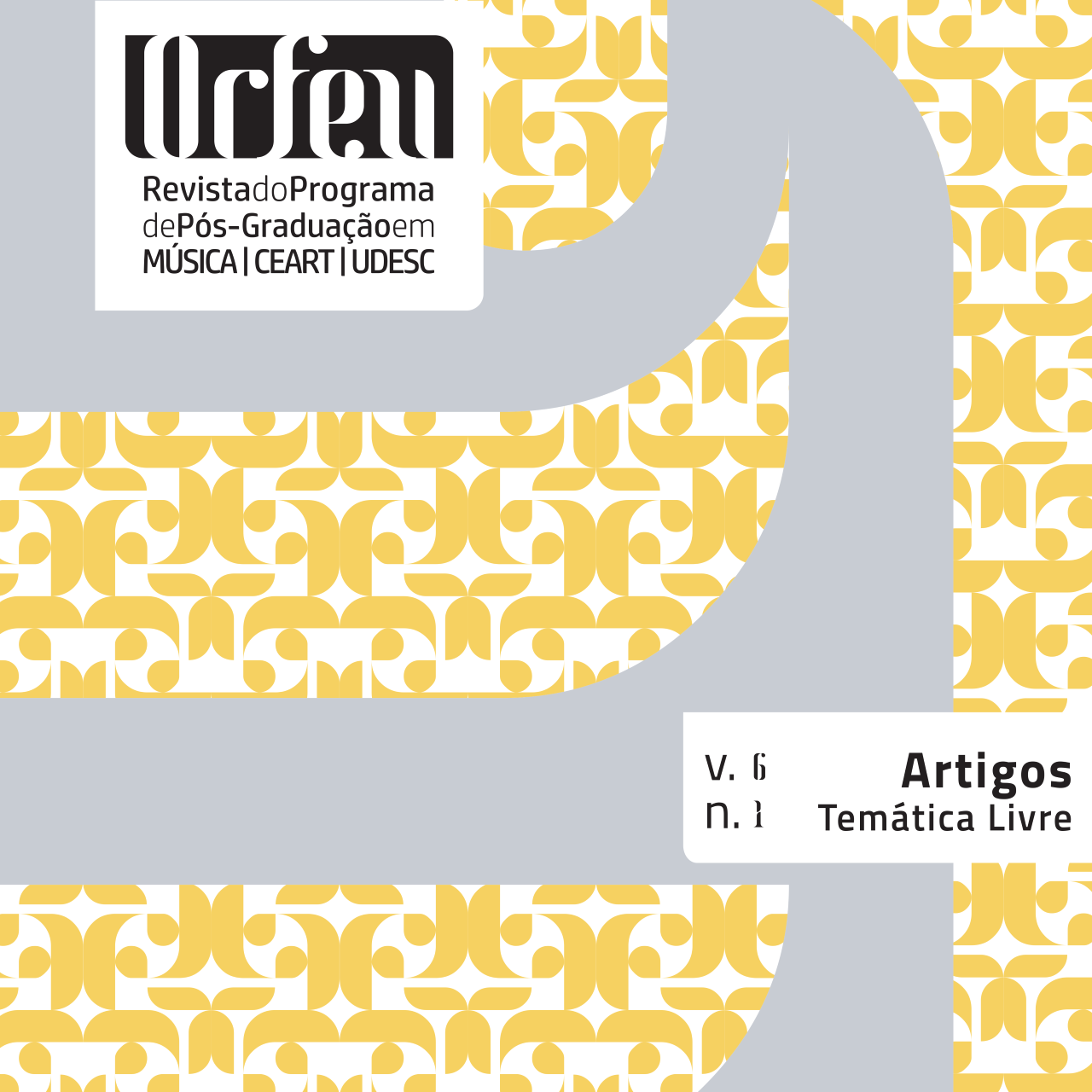A internacionalização na perspectiva da educação patrimonial: um projeto no campo da educação musical latino-americana
DOI:
https://doi.org/10.5965/2525530406012021e0017Palavras-chave:
patrimônio cultural, projetos internacionais, arte e educação, prática musical, prática artísticaResumo
Este texto apresenta reflexões emersas da análise das ações de um projeto de internacionalização desenvolvido em parceria entre duas instituições de ensino superior de dois países latino-americanos: Brasil e Chile, entre 2018 e 2019. Tanto as proposições quanto as discussões apresentadas tomaram como fundamento os princípios da educação patrimonial contemporânea e a ideia de internacionalização proposta por Kertz-Welzel (2018). Como resultado, a análise das ações permite dizer que a internacionalização, quando parte de planejamento colaborativo e integrado com as comunidades participantes, se consolida num processo educativo de construção, identificação e valorização de patrimônios que rompem fronteiras, visando à construção de comunidades de práticas artísticas culturalmente sensíveis e mundialmente conectadas.
Downloads
Referências
BRANDELLERO, A. et al. Popular music as cultural heritage: scoping out the field of practice. Inter-national Journal of Heritage Studies, v. 20, n. 3, p. 224-240, 2013. Disponível em: http://bit.ly/2YpurC9. Acesso em: 30 abr. 2019.
CALAF, R.; FONTAL MERILLAS, O. (coord.). Miradas al patrimonio. Gijón: Ediciones Trea, 2006. Dis-ponível em: http://bit.ly/2Oj82GB. Acesso em: 12 jun. 2019.
CANTÓN, V. La Educación Patrimonial, como estrategia para la formación ciudadana. Correo del Maestro, Monterey, México, n. 154, marzo 2009. Disponível em: http://bit.ly/2QQ0hr5. Acesso em: 15 jul. 2019.
CASTRO, J. R. B. As festas em louvor a São João Batista na Bahia: práticas devocionais e elementos míticos na interface sagrado/ profano. In: SERPA, A. (org.). Espaços culturais: vivências, imaginações e representações. Salvador: EDUFBA, 2008. p. 181-197.
DUSSEL, E. Transmodernidade e interculturalidade: interpretação a partir da filosofia da libertação. Revista Sociedade e Estado, v. 31, n. 1, p. 51-73, jan./abr. 2016.
FLORÊNCIO, S. R. R. Educação patrimonial: um processo de mediação. In: TOLENTINO, Á. B. Educa-ção patrimonial: reflexões e práticas. João Pessoa: IPHAN, 2012. p. 22-29.
FONTAL MERILLAS, O. Educación patrimonial: retrospectiva y prospectivas para la próxima década. Estudios Pedagógicos, v. 42, n. 2, p. 415-436, 2016. Disponível em: http://bit.ly/2SFt80z. Acesso em: 20 maio 2019.
FONTAL MERILLAS, O. (coord.). La Educación Patrimonial: del patrimonio a las personas. Gijón: Edi-ciones Trea, 2013. Disponível em: https://bit.ly/2Tdkbw4. Acesso em: 14 jun. 2019.
GARCÍA VALECILLO, Z. La educación patrimonial: Retos y pautas para educar a la ciudadanía desde lo patrimonial en Latinoamérica. CABÁS, n. 14, p. 58-73, 2015. Disponível em: http://bit.ly/2JTNPmq. Acesso em: 19 jun. 2019.
GOMES, N. L. O Movimento Negro e a intelectualidade negra descolonizando os currículos. In: BER-NARDINO-COSTA, J.; MALDONADO-TORRES, N.; GROSFOGUEL, R. (org.). Decolonialidade e pensa-mento afrodiáspórico. Belo Horizonte: Autêntica, 2018. p. 223-246.
HALL, S. A identidade cultural na pós-modernidade. 4. ed. Rio de Janeiro: DP&A, 2005.
HALL, S. El trabajo de la representación. Lima: IEP – Instituto de Estudios Peruanos, 2002.
IBARRA, M. Patrimônio e comunidade. Perspectiva da educação patrimonial Chilena (1970-2015). Mouseion, Canoas, n. 23, p. 15-40, abr. 2016. Disponível em: https://revistas.unilasalle.edu.br/in-dex.php/Mouseion/article/view/2788. Acesso em: 20 mar. 2019.
IBARRA, M.; BONOMO, U.; RAMIREZ, C. El patrimonio como objeto de estudio interdisciplinario: Reflexiones desde la educación formal chilena. Polis, Santiago, v. 13, n. 39, p. 373-391, dic. 2014. Disponível em: http://bit.ly/30XjLvU. Acesso em: 12 mar. 2019.
JODELET. D. Representações sociais e mundos de vida. São Paulo: Fundação Carlos Chagas; Curitiba: PUCPress, 2017.
KERTZ-WELZEL, A. Globalizing Music Educacion: A Framework. 1 ed. Indiana: Indiana University Press, 2018.
LANDER, E. et al. A colonialidade do saber: eurocentrismo e ciências sociais. Perspectivas latino-americanas. Buenos Aires: CLACSO, 2005.
MALDONADO-TORRES, N. Sobre la colonialidad del ser: contribuciones al desarrollo de un con-cepto. In: CASTRO-GÓMEZ, S.; GROSFOGUEL, R. El giro decolonial. Reflexiones para una diversidad epistémica más allá del capitalismo global. Colombia: Siglo del Hombre, 2007. p. 127-167.
MIRANDA, C. Clandestinización y re-existencia diaspórica: horizontes expedicionários e insurgencia en afroamérica. In: SEPTIEN, R. C.; BIDASECA, K. et al. Más allá del decenio de los pueblos afrodes-cendentes. Buenos Aires: CLACSO, 2017.
QUIJANO, Aníbal (ed.). Des/colonialidad y bien vivir: un nuevo debate en America Latina. Lima: Editorial Universitaria, 2014.
SANTOS, B. de S. A crítica da razão indolente: contra o desperdício da experiência. 4. ed. São Paulo: Cortez, 2002.
TOLENTINO, Á. B. Educação Patrimonial decolonial: perspectivas e entraves nas práticas de patri-monialização federal. Revista Sillogés, v. 1, n. 1, p. 41-60, jan./jul. 2018. Disponível em: https://bit.ly/3noMvsr. Acesso em: 10 dez. 2020.
WALSH, C. Pedagogías decoloniales: prácticas insurgentes de resistir, (re)existir y (re)vivir. Tomo II. Quito, Ecuador: Abya-Yala, 2017. Disponível em: https://ayalaboratorio.com/2018/03/31/catherine-walsh-pedagogias-decoloniales-praticas-insurgentes-de-resistir-reexistir-e-reviver/. Acesso em: 10 dez. 2020.
WALSH, C. Interculturalidad y (de)colonialidad: perspectivas críticas y politicas. Visão Global, Joa-çaba, v. 15, n. 1-2, p. 61-74, 2012. Disponível em: http://bit.ly/2K8Em9R. Acesso em: 16 jan. 2019.
WALSH, C. Interculturalidad, Estado, Sociedad: luchas (de)coloniales de nuestra época. Quito: Uni-versidad Andina Simón Bolívar; Abya-Yala, 2009.
Downloads
Publicado
Como Citar
Edição
Seção
Licença
Copyright (c) 2021 Andréia Veber, Solange Franci Raimundo Yaegashi, Paulina Alejandra Reyes Díaz

Este trabalho está licenciado sob uma licença Creative Commons Attribution 4.0 International License.






